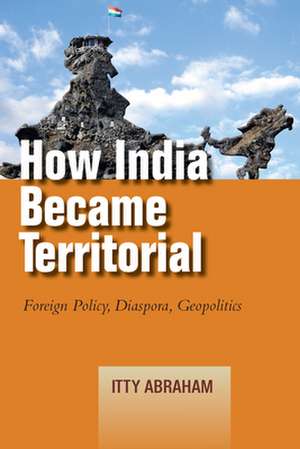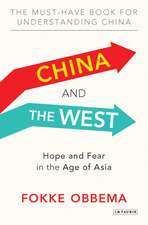How India Became Territorial: Foreign Policy, Diaspora, Geopolitics: Studies in Asian Security
Autor Itty Abrahamen Limba Engleză Hardback – 19 aug 2014
Why do countries go to war over disputed lands? Why do they fight even when the territories in question are economically and strategically worthless? Drawing on critical approaches to international relations, political geography, international law, and social history, and based on a close examination of the Indian experience during the 20th century, Itty Abraham addresses these important questions and offers a new conceptualization of foreign policy as a state territorializing practice.
Identifying the contested process of decolonization as the root of contemporary Asian inter-state territorial conflicts, he explores the political implications of establishing a fixed territorial homeland as a necessary starting point for both international recognition and national identity—concluding that disputed lands are important because of their intimate identification with the legitimacy of the postcolonial nation-state, rather than because of their potential for economic gains or their place in historic grievances.
By treating Indian diaspora policy and geopolitical practice as exemplars of foreign policy behavior, Abraham demonstrates how their intersection offers an entirely new way of understanding India's vexed relations with Pakistan and China. This approach offers a new and productive way of thinking about foreign policy and inter-state conflicts over territory in Asia—one that is non-U.S. and non-European focused—that has a number of implications for regional security and for foreign policy practices in the contemporary postcolonial world.
Identifying the contested process of decolonization as the root of contemporary Asian inter-state territorial conflicts, he explores the political implications of establishing a fixed territorial homeland as a necessary starting point for both international recognition and national identity—concluding that disputed lands are important because of their intimate identification with the legitimacy of the postcolonial nation-state, rather than because of their potential for economic gains or their place in historic grievances.
By treating Indian diaspora policy and geopolitical practice as exemplars of foreign policy behavior, Abraham demonstrates how their intersection offers an entirely new way of understanding India's vexed relations with Pakistan and China. This approach offers a new and productive way of thinking about foreign policy and inter-state conflicts over territory in Asia—one that is non-U.S. and non-European focused—that has a number of implications for regional security and for foreign policy practices in the contemporary postcolonial world.
Din seria Studies in Asian Security
-
 Preț: 223.78 lei
Preț: 223.78 lei - 23%
 Preț: 777.47 lei
Preț: 777.47 lei -
 Preț: 195.32 lei
Preț: 195.32 lei -
 Preț: 207.62 lei
Preț: 207.62 lei -
 Preț: 210.91 lei
Preț: 210.91 lei -
 Preț: 228.62 lei
Preț: 228.62 lei -
 Preț: 157.94 lei
Preț: 157.94 lei -
 Preț: 193.58 lei
Preț: 193.58 lei -
 Preț: 265.56 lei
Preț: 265.56 lei -
 Preț: 177.64 lei
Preț: 177.64 lei -
 Preț: 173.10 lei
Preț: 173.10 lei -
 Preț: 244.10 lei
Preț: 244.10 lei - 19%
 Preț: 447.32 lei
Preț: 447.32 lei - 19%
 Preț: 536.91 lei
Preț: 536.91 lei -
 Preț: 263.05 lei
Preț: 263.05 lei -
 Preț: 187.76 lei
Preț: 187.76 lei -
 Preț: 445.11 lei
Preț: 445.11 lei -
 Preț: 444.14 lei
Preț: 444.14 lei - 23%
 Preț: 725.31 lei
Preț: 725.31 lei - 19%
 Preț: 448.80 lei
Preț: 448.80 lei - 19%
 Preț: 477.19 lei
Preț: 477.19 lei -
 Preț: 512.32 lei
Preț: 512.32 lei -
 Preț: 211.46 lei
Preț: 211.46 lei - 19%
 Preț: 448.80 lei
Preț: 448.80 lei - 19%
 Preț: 476.44 lei
Preț: 476.44 lei -
 Preț: 517.10 lei
Preț: 517.10 lei - 19%
 Preț: 447.87 lei
Preț: 447.87 lei
Preț: 644.44 lei
Preț vechi: 795.60 lei
-19% Nou
Puncte Express: 967
Preț estimativ în valută:
123.31€ • 129.09$ • 102.03£
123.31€ • 129.09$ • 102.03£
Carte tipărită la comandă
Livrare economică 05-19 aprilie
Preluare comenzi: 021 569.72.76
Specificații
ISBN-13: 9780804791632
ISBN-10: 0804791635
Pagini: 240
Dimensiuni: 152 x 229 x 18 mm
Greutate: 0.45 kg
Ediția:New.
Editura: Stanford University Press
Colecția Stanford University Press
Seria Studies in Asian Security
ISBN-10: 0804791635
Pagini: 240
Dimensiuni: 152 x 229 x 18 mm
Greutate: 0.45 kg
Ediția:New.
Editura: Stanford University Press
Colecția Stanford University Press
Seria Studies in Asian Security
Recenzii
"Strikingly innovative . . . Abraham's rich and rewarding discussion on India's territoriality and foreign policy deserve a wider airing beyond the ivory tower."—C. Raja Mohan, The Book Review
"How India Became Territorial is a long overdue account of the history of territorial sovereignty in India that explores how and why the territorial principle became the standard of national self-determination and the implication that this has had for India's domestic development and foreign policy. Others have explored these themes; however, Abraham usefully draws together literature from several disciplines to produce some interesting and novel insights."—Priya Chacko, Economic and Political Weekly
"Abraham utilizes critical approaches to international relations to reconceptualize the ways in which 'territory' is thought of . . . To support his theory, Abraham expertly uses India as a case study, demonstrating how its foreign policy has been essentially a boundary-making enterprise. He offers a novel way to understand why territorial disputes with neighboring states, such as Pakistan, have been hard to resolve by focusing on issues such as national identity and statehood . . . This work is an important contribution to the field of international relations and foreign policy . . . Summing Up: Highly Recommended."—A. Mazumdar, CHOICE
"In an intellectual space crowded with texts, Itty Abraham breaks new ground. He offers an elegant and insightful account of India's fraught boundaries and the stakes—both domestic and international—of struggles over them. At the same time he sheds new light on academic arguments in international relations and the very practical matter of what nation means in our international world."—Craig Calhoun, Director of the London School of Economics and Political Science
"Through territorial disputes with neighboring states, the actions of its diaspora and the overall geopolitics of its foreign policy, 'India' has been an active participant in its own making. In this fluently argued book, Itty Abraham shows that a territorial claim lies at the heart of Indian nation-statehood but that its legitimacy like that of nation-statehood worldwide remains perpetually in question."—John Agnew, UCLA, author of Globalization and Sovereignty
"This refreshingly original book has implications far beyond the important case of India. Drawing on post-colonial, feminist, and critical theory, Itty Abraham conceptualizes the international as an emergent space of struggle. In the process, he provides insights into both the nature of inter-state territorial disputes and of territoriality itself."—Thomas Biersteker, Gasteyger Professor, The Graduate Institute, Geneva
"A remarkably rich, thought-provoking and controversial reinterpretation of Indian foreign policy with territory at the centre that will interest not just scholars of post-colonial Asia, but international relations more broadly."—Ian Hall, Political Studies
"This refreshingly original book has implications far beyond the important case of India. Drawing on post-colonial, feminist, and critical theory, Itty Abraham conceptualizes the international as an emergent space of struggle. In the process, he provides insights into both the nature of inter-state territorial disputes and of territoriality itself."—Thomas Biersteker, Gasteyger Professor, The Graduate Institute, Geneva
"A remarkably rich, thought-provoking and controversial reinterpretation of Indian foreign policy with territory at the centre that will interest not just scholars of post-colonial Asia, but international relations more broadly."—Ian Hall, Political Studies
Notă biografică
Itty Abraham teaches in the Department of Southeast Asian Studies at the National University of Singapore.











